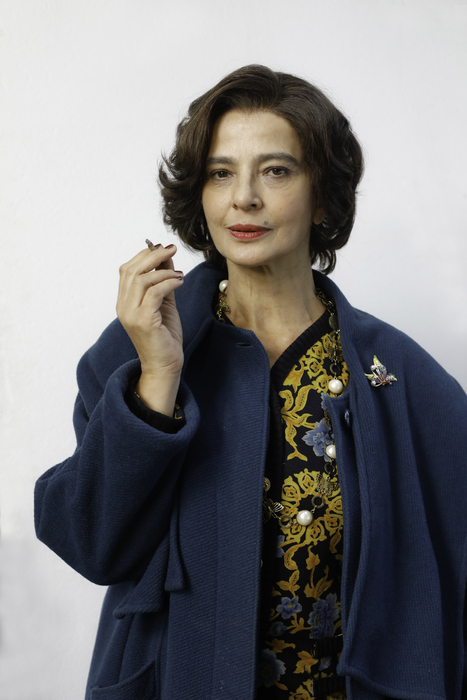Luis Granena
The setting is the White House – or rather a set of White House, the one inhabited by actors Kevin Spacey and Robin Wright in the TV show
House of Cards.
The year is 2015. Maria Alyokhina, better known as Masha, has already been jailed and released more than one time.
And she has begun to write her book about her, a Vonnegutesque memoir called
Riot Days
.
The memoir tells the story behind Pussy Riot, the feminist punk collective that made Alyokhina the kind of star that is invited to make a provocative cameo in a hit TV show.
It also depicts the author's day-to-day life in prison, with special emphasis on the freezing cold, systematic mistreatment and forced labor – problems that seem not to have changed since Dostoevsky's time.
And it also recounts Alyokhina's lifetime of defying tyranny.
In the third
House of Cards
episode of the show's third season, Masha and fellow Pussy Riot activist Nadya Tolokonnikova refuse to toast Viktor Petrov, the Vladimir Putin of the series, played by Lars Mikkelsen.
The women's appearance on the show reflected the fact that they are recognized as major players in history –although Masha is not so sure.
“As a teenager,” Masha recounts in
Riot Days
, “I used to do graffiti on one of the school walls.”
The wall was painted with historical motifs depicting a Russia she hadn't seen and didn't believe in.
“I liked seeing how the graffiti was gaining ground and began to mix with those historical episodes, giving shape to another truth, ours,” she writes.
Even then, the teenage Masha thought like an activist.
More information
Leader of Pussy Riot escapes Russia: 'Putin doesn't scare me.
He's a nobody'
Born in Moscow in 1988, Maria Alyokhina grew up in 1990s Russia, and she remembers “people queuing everywhere, queuing for food, clothes, vouchers.”
That, she says, has not changed.
"They tell us that the country has changed, but I keep seeing the queues."
Masha was raised by her mother de ella, a programmer, and did not meet her math teacher father until she was 21. She hated the Russian educational system and changed schools four times.
“They taught you not to think.
They wanted us to just follow the rules.
Obviously, I didn't like it at all,” she once said.
A poet, actress and mother, Masha studied journalism and creative writing and was a Greenpeace activist.
She has long been inspired by the performance artist and political provocateur Aleksander Brener.
Pussy Riot's first action took place in the same spot where Brener stood before the Kremlin with a pair of boxing gloves – the image of him dressed as a boxer became iconic – and asked the Russian president at the time, Boris Yeltsin, to come out and fight.
“There were eight of us, like the eight dissidents in 1968″ who protested against the occupation of Czechoslovakia, she recalls.
But the image that spread across the world, forever changing the West's conception that Russia had left its Soviet past behind, occurred in the Moscow Cathedral.
The action landed the collective in jail for the first time: the collective sang a song asking the Mother of God to become a feminist and free Russia from Putin.
Masha dressed in green and wore a yellow balaclava.
Lara Alcázar, the founder of the Spanish branch of the feminist activist group Femen,
“The protest seeks to arouse an opinion, a series of questions.
It has always been necessary, but right now there is an emergency.
It shows you the other side – in this case, where the oppressors and the oppressed are,” says Alcázar.
Today, Masha is hiding somewhere in Iceland, after having fled Russia with her partner Ella Lucy Shtein, both disguised as food couriers.
Her life is in danger.
Alcázar also points out that women who dedicate themselves to activism break many boundaries.
As with Femen's demonstrations, Pussy Riot's protests are especially powerful because they consist of direct action and provocation, she says.
Carol Paris, editor of the Spanish-language version of
Read & Riot: A Pussy Riot Guide to Activism
, says that the most interesting thing about the collective is how they transcend the idea of individuality.
“They show us how we can become active free agents.
We should all be Pussy Riot.”
And yet, as writer and translator Monika Zgustova points out, we cannot forget that Masha and the rest of the Pussy Riot “are in real danger, danger of being killed with a bullet to the forehead or a sophisticated poison, as has already happened to so many people who made the Kremlin uncomfortable.”
That danger "gives value, weight and seriousness to their message," a message that, as Nadya Tolokonnikov writes, they express through "barbaric and primitive political cabaret."

/cloudfront-eu-central-1.images.arcpublishing.com/prisa/5WVOX3WXPRCQVHEK4KTR6GFL5U.jpg)







